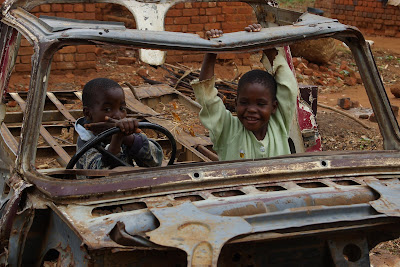You don’t walk around Blantyre after dark. Malawi may be one of the safer and friendlier places on the continent – not especially difficult when you’re dealing with countries the likes of Somalia & Sierra Leone or cities such as Johannesburg & Nairobi – but it’s still not a place to be taken too lightly come nightfall. By 6pm everyone is scurrying along the roads, making driving even more challenging with all the pedestrians by twilight, trying to get home before a curtain of dark envelops the town. Very few streetlights, minimal traffic, poor signposting and a distinct lack of businesses open late means the evening becomes a somewhat lonely affair on the streets. You certainly wouldn’t want to be out alone as a mzungu (‘white person’ in Chichewa, the local language) walking in the dark, that would be asking for trouble.
Yet if you scratch the surface, Blantyre is very much active come night, you simply need to know where to look. Heaving bars hide surreptitiously behind large guarded gates, reasonable and varied restaurants lurk secretively down dark alleyways and there’s always someone having drinks or dinner or something of the like in a private home somewhere. You could fill your social calendar twice over ever night of the week if you accepted every invitation that is thrown your way here. I think we have more on in Blantyre throughout each week than we ever had in Melbourne.
One of the goals for us in our move to Blantyre was to get to know plenty of Africans and to maintain as much of a local influence to our lives as manageable. Something we presumed wouldn’t be too difficult given our single local salary and the vast predominance of black Africans living here. In fact, other than the second generation whites and the expatriate community in Blantyre, there are literally no white Malawians. The problem is that the expat community in this place is huge. Within only a couple of weeks of living here we have rapidly realised that there is something social on within the expat world every single night… and given how much more relaxing it is culturally to spend time with westerners, it becomes quite a trap very rapidly. Hash House Harriers running on a Monday night, volleyball Wednesdays, happy hour at one of the expat bars Tuesdays and Thursdays, live music at the Blue Elephant Bar on Wednesdays, more running on Thursdays, always a going away or housewarming or birthday party Fridays & Saturdays. Add to that some Chichewa lessons, on call for work, multiple trips away from Blantyre on weekends and being invited to dinner by a constant stream of friends given you’re the new kid on the block to begin with, and you have barely got time to scratch yourself.
 We had also planned life in Africa to be somewhat of a break from alcohol. Think again. Greens, the local name for the ubiquitous Carlsberg beer (Blantyre being the only city on the continent with a Carlsberg brewery) due to the green label, seem to be a part of every activity here. Unfortunately, drink driving is also something that seems rather prevalent given the lack of safety on the streets at night and a complete lack of any formal taxi service. This isn’t helped by the police only owning a single breathalyzer for the whole city, and knocking off from work at midnight anyway. One of our friends, Henry, managed to get pulled over and tested by this one breathalyzer after a few too many Greens at the Blue Elephant one night.
We had also planned life in Africa to be somewhat of a break from alcohol. Think again. Greens, the local name for the ubiquitous Carlsberg beer (Blantyre being the only city on the continent with a Carlsberg brewery) due to the green label, seem to be a part of every activity here. Unfortunately, drink driving is also something that seems rather prevalent given the lack of safety on the streets at night and a complete lack of any formal taxi service. This isn’t helped by the police only owning a single breathalyzer for the whole city, and knocking off from work at midnight anyway. One of our friends, Henry, managed to get pulled over and tested by this one breathalyzer after a few too many Greens at the Blue Elephant one night.‘Blow into the machine sir.’ Henry promptly did as he was told, although very softly.
‘No sir, like this,’ added the cop, demonstrating an adequate breath.
‘Oh,’ replied Henry, promptly sticking the tube up his nose and blowing as hard as he could. The policeman was apparently quite thrown by the yellow-green slime that now coated his brand new machine. Bewildered, he examined it for a moment.
‘You can go sir,’ came his less than confident response to this somewhat unconventional method. ‘What’s my reading?’ inquired Henry, now rather amused by the whole thing.
‘Um, I don’t know, but you can go.’
'To drink and not drive,' quotes Henry, 'now that would be dangerous.'










